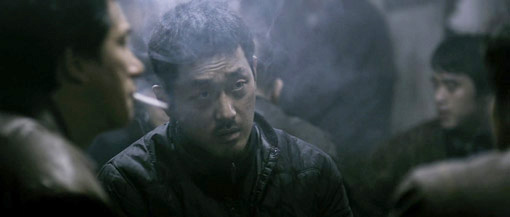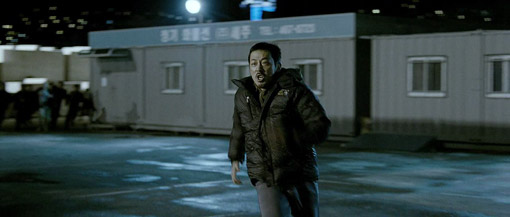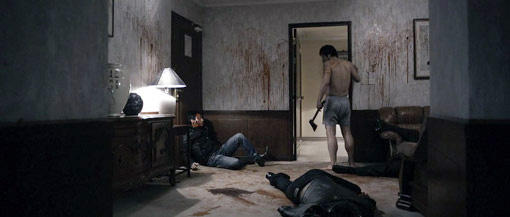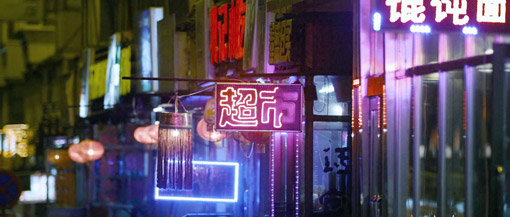"Perhaps the stabbiest film ever made." |
Kim Newman in Empire |
When your first feature is as widely admired as The Chaser [Chugyeogja], the pressure is really on to deliver a follow-up that is, at the very least, every bit its equal. Somewhat inevitably, whatever the filmmaker serves up is going to be viewed with less favour by at least some of those who championed its predecessor. There's a degree of artistic snobbery to this, with fame and advance word stripping away the sense of ownership that comes from championing a film that others may not otherwise be aware of. But there's also a degree of logic at work here. It's rarely just one aspect that makes us fall in love with a particular film, but the harmonious melding of a whole number of elements. At its very best it's a rare and beautiful thing, one that chance and a whole string of almost indefinable components have a hand in making work as well as it does. You want an example? Try comparing Gus van Sant's shot-for-shot remake of Psycho with Hitchcock's original. Technically they're the same movie, but in terms of film magic they are light years apart.
No doubt about it, The Chaser was one hell of crime thriller, one that made a big enough international splash to kick off a Hollywood remake and send Twentieth Century Fox scurrying to director Na Hong-jin's door in search of a picture deal. This much is unsurprising. What is a little unusual is that Fox were not looking to haul Na off to Hollywood to direct their next big summer blockbuster, but to co-fund a follow-up Korean venture under its Fox International Productions banner. Which may suggest that Na was required to ease up on the violence and tone down the darker elements that so distinguished the first film. Frankly, if you go into The Yellow Sea with this expectation then you're likely going to emerge needing a bottle of tranquillisers and psychiatric support.

It all starts deceptive calmly. Cab driver Gu-nam lives in Yanji City, which is situated in the Yanbian Autonomous Prefecture between North Korea, China and Russia. Six months earlier his wife left for South Korea in search of work and he has not heard from her since. Stuck with the exorbitant cost of her black market visa, Gu-nam is now heavily in debt to loan sharks and bad luck mocks his attempts to win money at mah-jong. With his situation desperate, he is introduced to local gangster Myun Jung-hak, who offers to clear the debt if Gu-nam agrees to go to Seoul and kill a man named Kim Seung-hyun. "Go see your wife too," Myun suggests. "You can bring her back or kill her." When Gu-nam reluctantly accepts the deal, he is assured that should he fail or falter in his mission, his mother and young daughter will be killed in retaliation.
Once in Seoul, Gu-nam scopes out his prey and quickly discovers that killing him is not going to be easy. A figure of some importance, the man is dropped at his door each evening by his driver, a personal protector who shuts the building's security gate behind him and remains vigilant outside his apartment building until he is safely upstairs. There's nowhere inside for Gu-nam to lie in wait, as his target's apartment is also securely gated and the corridor kitted out with motion-activated lights. As the deadline for the completion of the job approaches, Gu-nam divides his time between formulating his assassination plan and unsuccessfully attempting to track down his absent wife. A request phoned to Myun for a two-day extension is soundly rejected and the consequences of failure are once again spelt out. Then, on the last possible night he can carry out the hit and safely make his way home, Gu-man tools up and approaches the apartment and...
And that's where any self-respecting plot summary should stop. If you want to know what happens next then you need to watch the film, as you'll get a lot more out of seeing it than you ever will from having me spell it out for you in surprise-spoiling detail. What I can tell you is that it's here that everything changes. Up until this point the film has played out as a restrained and economically told personal drama, one focussed exclusively on Gu-nam, his financial plight, his journey to Seoul, his search for his wife, and his careful preparations for his designated task. I'd even go as far as to suggest that up to this point the film feels closer in style and tone to modern Chinese cinema than its Korean equivalent. But as Gu-nam approaches Kim apartment building, the film really delivers on its thriller credentials in a compellingly handled scene of unexpected twists and nail-chewing tension, climaxing in the first of a series of breathless chase sequences that suggest that Na is adopting the title of his first film as a cinematic signature.

It's following this that the film's focus widens, as Gu-nam realises he's been set-up and finds himself part of a far bigger game, hunted by both the police and a Korean criminal organisation led by ruthless businessman Kim Tae-won. Things complicate further when Kim attempts to take retaliatory action against Myun and sparks off a gang war that brings Myun onto Kim's doorstep, where he starts his own search for the increasingly desperate Gu-nam. And when people come into conflict here, the results are always violent, and I'm not talking the sort of cartoon gunfire, explosions and fisticuffs of Hollywood actioners, but the sort that makes you wince and suck air through your teeth. In The Yellow Sea people are injured and killed almost exclusively with blades, and there is a lot of killing here. Seriously, if the very idea of seeing someone stabbed even in the relatively safe artificiality of a movie makes you shudder, then there is no way you're ready for what unfolds here, particularly when the conflict expands into gang war. Imagine an old school John Woo gangland shoot-out but carried out with knives and hatchets and without the distancing glamour of Woo's poetically shot slow motion and you're getting the idea. There is, I can assure you, a very good reason I put that Kim Newman quote at the top of this review. This does, however, bring home the brutal reality of what it means to inflict violence on your fellow man (and make no mistake, this is a very male world) in a way that no gun battle could really convey. This is hardly surprising, as few of us know what it feels like to be shot, the experience of accidentally cutting yourself with a knife or another sharp object is one that most of us are painfully familiar with.
A little surprisingly, perhaps, the film also fascinates in its socio-political detail, in the sly hints at the lowly status of the Korean-Chinese Joseonjok (a colloquial name for Chinese people of Korean descent) and the conditions under which they are smuggled into Korea. This subculture status also gives rise to one of the film's most intriguing exchanges, when Gu-man is casing the apartment block and finds his target standing unexpectedly before him. When the bodyguard rushes forward to deal with this interloper, his employer verbally restrains him, expressing sympathy with Gu-man's status as a penniless Joseonjok by giving him money and directing him to where he might find a bed for the night.
The social divide between the residents Yanji City and Seoul is also reflected in their respective gang leaders. While well-dressed businessman Kim commands the loyalty and respect of his troops through wealth and position, Myun does so by being considerably harder than any his troops, something Kim fails to appreciate until it flies into Seoul to bite him in the arse. The threat Myun represents is strikingly established when three of Kim's men silently break into his hotel room with orders to kill him, and a short unseen scuffle later all three are on the floor and the bloodied figure of Myun is standing over them holding an axe. A couple of edits later the sole survivor is spilling the beans while members of Myun's gang (including a nonchalant woman with a cigarette jammed in her mouth) calmly clean up the blood and carve up the bodies. It's with good reason that Kim looks so nervous when a Myun strides self-confidently into his lair.

Not everything works quite so well. While the image of bumbling police has become an almost endearing element of modern Korean crime cinema, some of the cops here really are dopey. The road-block patrolmen who behave like they've never held a gun in their lives and manage to shoot one of their own are a prime example, and although it makes for a thrilling sequence, it's a little hard to believe that Gu-man could outrun what looks like half the city's police because they're too clumsy to hold onto him, too slow to catch him on foot and too cack-hand behind the wheel of a car to drive more than a few hundred feet without crashing. And while the foot pursuits are excitingly staged, a late film car chase sees director Na's instincts desert him in a mess of frantically waggly camera shots and scattershot editing, a sequence that is almost devoid of tension because it's nigh on impossible to work out what's happening. Too much time spent watching the Bourne films, methinks.
But these are small gripes in what is a otherwise a terrific second film from a director who is showing every sign of being the new shining star of Korean crime thrillers. Comparisons with The Chaser are inevitable given that Na is working in similar territory and has re-employed several of that film's cast and crew, including leading man Ha Jung-woo, cinematographer Lee Sung-Je and editor Kim Sun-min, all of whom deliver similarly outstanding work here. Like a good many of its Korean brethren, it's not for the squeamish, and experience tells us early on that it's unlikely to end well for any of the unfortunate characters. But there's too much that is too good here to start dismissing the film – as a few have been a little to quick to do – for not being quite as finely tuned as Na's auspicious debut feature. We can only hope that the Korean industry does right by its latest bright young hope and that he is not prematurely lured to Hollywood to become another faceless director of generic action thrillers.
It's worth noting that the version on Bounty's UK Blu-ray and DVD release is a 140 minute cut of the film prepared by director Na for international release, and is 17 minutes shorter than the Korean director's cut, but 4 minutes longer than the version being released in the US by 20th Century Fox. Word is that Fox, having a financial stake in the film, have applied pressure to keep the director's cut from being released worldwide, for reasons I could only guess at after swallowing some mind-expanding drugs. Man, you get in bed with a Hollywood studio...
From what I observed in the making-of documentary on this very disc, The Yellow Sea appears to have been shot on a combination of 35mm film and more than one format of HD video, which have all been mixed and matched almost invisibly here. The image quality is certainly on a par with other Korean HD imports of late (Optimum's Blu-ray of Bong Joon-ho's Mother being the standard-setter), having a consistently crisp level of detail, spot-on contrast and rich colours when required. The night scenes are also impressively handled, with strong black levels maintained without giving the shadow detail a pounding.

The DTS-HD Master Audio 5.1 surround track is, for the most part, a surprisingly restrained affair, at least for a Korean action thriller. The surrounds are precisely employed for specific sound effects, but ambient location sound is kept at the sort of volume that subtly creates a sense of place without ever shouting its presence. The clarity and dynamic range is, as you would expect, consistently excellent, and when bass and aural punch is needed – car crashes and the flipping of an articulated truck, for example – they deliver without rattling the windows too violently.
Making of Documentary (1:17)
A consistently interesting collection of behind-the-scenes footage cut with interviews with director Na Hong-jin, actors Ha Jung-woo, Kim Yun-seok, Cho Sung-ha and Cho Sung-ha, and cinematographer Lee Sung-je and martial arts director (actually stunt director would be more accurate here) Yoo Sang-sub. The production strikes a nice balance between studio production values and the do-it-yourself aspects of independent cinema – watching Lee Sung-je struggle up the side of a steep grassy slope with a heavy camera on his shoulder brought back some personal memories – and it was nice to hear that Lee regards the material shot in China as his favourite in the film. The shooting of a number of key scenes are observed at varying length, with the action scenes getting the lion's share of coverage.
Also on board are the UK Theatrical Trailer (1:32), which manages to sell the film well as an action thriller without giving too much away, the Korean Theatrical Trailer (2:06), which is basically the same trailer but longer (a bit like the Korean cut of the film, then), and a UK Teaser Trailer (1:18).
Two films in and Na Jung-woo is already one of the hottest directors working in modern Korean cinema. Complaints that The Yellow Sea is not The Chaser Part 2 have no place here – the film stands on its own merits as a thoughtful, intense and exciting crime thriller, one with a supremely violent streak and a high body count, but whose craft, storytelling and attention to character detail (just watch the expression on Gu-nam's mother's face as he approaches her house) reward multiple viewings. Bounty's Blu-ray boasts a fine transfer and a making-of documentary of substantial length. If you can deal with the violence, then this comes very definitely recommended.
|